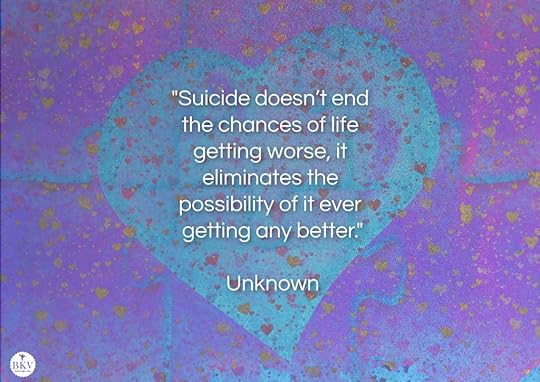Keeping the Conversation Going about Suicide
@bethvogt
This isn’t the blog post I’d originally written for today.
Seven weeks have passed since my friend’s death by suicide. My sadness is sometimes a dull ache; at other times my heart breaks all over again.
Last night I realized September is National Suicide Awareness Month, also known as Suicide Prevention Month.
I couldn’t ignore the God-prompt to set aside my completely prepared post and talk with you about suicide prevention.
Families and friends separated from loved ones by suicide often wonder, “Why didn’t I know?” or “What more could I have done?” Suicide is a difficult issue because people who are suicidal often don’t talk freely about their struggles. Suicidal thoughts are a formidable foe that often shames and isolates people.
Do you know these statistics about suicide in the United States?
10th leading cause of death in the U.S.
In 2018, 48, 344 Americans died by suicide. There were an estimated 1.4 million suicide attempts.
On average, there are 132 suicides per day. Another way to look at this: On average, one person commits suicide every 16.2 minutes.
54% of Americans have been affected by suicide.
We often talk about how serious a person is about suicide based on whether a person has planned “how” or not. I discovered the recommendation that people struggling with suicidal thoughts develop a “suicide safety plan.”
“When you’re in a crisis situation, it’s not the time to figure out how you’re going to handle it,” said Jill Harkavy-Friedman, a clinical psychologist and vice president of research for the American Foundation for Suicide Prevention. “What a safety plan does is it helps you figure out beforehand a strategy for handling distress.”
Along with writing the plan with someone you trust and sharing copies of your plan with several people you trust – their names and contact information should be listed on your plan – the Suicide Prevention Resource Centers recommends using the list to identify your personal warning signals, such as:
Increased use of alcohol or drugs
Withdrawing or feeling isolated
Talking about being a burden
Extreme mood swings
Also include ways to distract yourself, including:
Exercising
Calling a friend
Meditating
Listening to music
Is a safe plan a guarantee against suicide? I wish it was, but no. Suicide and depression are linked, and the combination can increase the likelihood that a person struggles with shame and the inability to be completely honest.
What can we do? We can be available and trustworthy to the ones we love who are hurting. If we see warning signs of any kind, then we reach out. We listen. We pray. If the situation warrants, we offer to help them find professional counseling.
Suicide Lifeline: If you or someone you know may be struggling with suicidal thoughts, you can call the U.S. National Suicide Prevention Lifeline at 800-273-TALK (8255) any time of day or night or chat online.
Keeping the Conversation Going about Suicide https://bit.ly/3clvk7f #NationalSuicidePevention #hope
Click To Tweet
'Suicide doesn't end the chances of life getting worse, it eliminates the possibility of it ever getting any better.' Quote by Unknown https://bit.ly/3clvk7f #NationalSuicidePevention #honesty
Click To Tweet
Sources:
American Foundation for Suicide Prevention https://afsp.org/
USA Today https://buff.ly/2TZytQy



